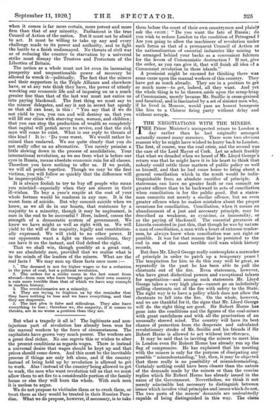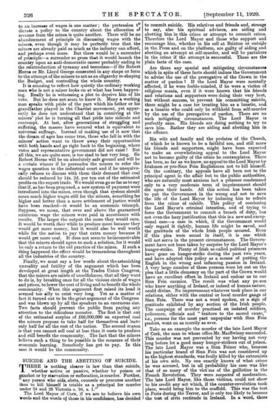THE NEGOTIATIONS WITH THE MINERS. T HE Prime Minister's unexpected return
to London a day earlier than he had originally arranged naturally caused many surmises. There were two obvious reasons why he might have wished to hurry back to London. The first, of course, was the coal crisis, and the second was the case of the Lord Mayor of Cork. Let .us admit frankly that what we dreaded when we heard of Mr. Lloyd George's return was that he might have it in his heart to think that nobody could settle these matters of public policy so well as himself, and that he had come home to bring about a general conciliation which in the result would be indis- tinguishable from an absolute sacrifice of principle. A statesman can have no greater fault or can commit no greater offence than to be backward in acts of conciliation when conciliation is for the public good. But a states- man commits not merely a similar offence, but an even greater offence when he makes mistakes about the proper occasions for conciliation. Conciliation, when it means an abandonment of a just and necessary principle, may be described as weakness, as cynicism, as immorality, or as the paying of blackmail. The essential greatness of Lincoln consisted in just this, that though he was by nature a man of conciliation, a man with a heart of extreme tender- ness, he always knew when conciliation was not right or possible. It was for that reason that he persisted to the end in one of the most terrible civil wars which history records.
But does Mr. Lloyd George really contemplate a surrender of principle in order to patch up a temporary peace ? The temptation for him to do this may well be great, as repeatedly in the past he has been able to pull the chestnuts out of the fire. Even statesmen, however, who have great dialectical powers and exceptional talents for negotiation—and among such statesmen Mr. Lloyd George takes a very high place—cannot go on indefinitely pulling chestnuts out of the fire with safety to the State. The right way is to have a policy which does not allow the chestnuts to fall into the fire. On the whole, however, and we are thankful for it, the signs that Mr. Lloyd George will do the right thing are good. Sir Robert Horne has gone into the conditions and the figures of the coal-mines with great carefulness and with all the penetration of an unusually shrewd mind. The country will have its best chance of protection from the desperate and calculated revolutionary stroke of Mr. Smillie and his friends if Sir Robert Horne is allowed to act without interference.
It may be said that in inviting the miners to meet him in London even Sir Robert Home has already run up the -flag of compromise. He has explained that his meeting with the miners is only for the purpose of dissipating any possible " misunderstanding," but, then, it may be objected that there really is no possibility of misunderstanding. Certainly nothing could have been clearer than the nature of the demands made by the miners or than the concise replies which Sir Robert Home has already issued in the name of the Government. Nevertheless, we think it not merely admissible but necessary to distinguish between issues which involve vital principles and issues which do not. The two parts of the miners demands are undoubtedly capable of being distinguished in this way. The claim to an increase of wages is one matter ; the pretension t° dictate a policy to the country about the allocation of revenue from the mines is quite another. There will be no abandonment of principle in discussing wages with the miners, even though it may be perfectly true that the miners are already paid as much as the industry can afford, and perhaps even more. But there would be a surrender of principle—a surrender so gross that it would launch the country upon an anti-democratic career probably ending in the reintroduction of tyranny and terrorism—if Sir Robert Horns or Mr. Lloyd George consented in any shape or form to the attempt of the miners to act as an oligarchy re-shaping the Budget, and controlling the whole country.
It is amazing to reflect how quietly the ordinary working man who is not a miner looks on at what has been happen- ing. Really he is witnessing a plot to deprive him of his vote. But he does not seem to know it. Many a working man speaks with pride of the part which his father or his grandfather played in the Chartist movement, yet appar- ently he does not understand that in conniving at the miners' plot he is turning all that pride into ridicule and contempt. At last, after generations of struggling and suffering, the masses have secured what is equivalent to universal suffrage. Instead of making use of it now that the dream of ages has come true, those who fall in with the miners' action want to throw away their opportunities with both hands and go right back to the beginning, where votes and representative government did not exist ! But all this, we are quite sure, is too Mad to last very long. Sir Robert Horne will be on absolutely safe ground and will be a certain winner if he persuades the miners to refer the wages question to the industrial court and if he unequivo- cally refuses to discuss with them their demand that coal should be reduced by 14s. 2d. per ton out of the estimated profits on the export trade. We would even go so far as to say that if, as has been proposed, a new system of payment were introduced into the mines, even though that system should mean much higher wages still for the miners, something far higher and better than a mere settlement of justice would have been reached—it would be an economic triumph. Suppose, we mean, that over and above the guaranteed minimum wage the miners were paid in accordance with results. The larger the output the more they would earn. It would be worth their while to produce more because they would get more money, but it would also be well worth while for the nation to pay that extra money because it would get more coal. It does not seem to be inconceivable that the miners should agree to such a solution, for it would be only a return to the old practice of the mines. If such a thing happened the effect would be tremendous throughout all the industries of the country.
Finally, we must say a few words about the astonishing unreality and futility of the argument which has been developed at great length at the Trades Union Congress, that the miners are saints of unselfishness, that all they want to do is, by breaking once for all the vicious circle of wages and prices, to lower the cost of living and to benefit the whole community. When this argument first raised its head it seemed too silly to exist very long. Yet as a matter of fact it turned out to be the great argument of the Congress and was blown up by all the speakers to an enormous size. Two facts should prevent the public from paying any attention to the ridiculous monster. The first is that out of the estimated surplus of £66,000,000 on exported coal the miners propose to take half for themselves and leave only half for all the rest of the nation. The second reason is that you cannot sell coal at less than it costs to produce and still benefit the community. The fact that the miners believe such a thing to be possible is the measure of their economic learning. Somebody has got to pay. In this ease it would be the community.



































 Previous page
Previous page